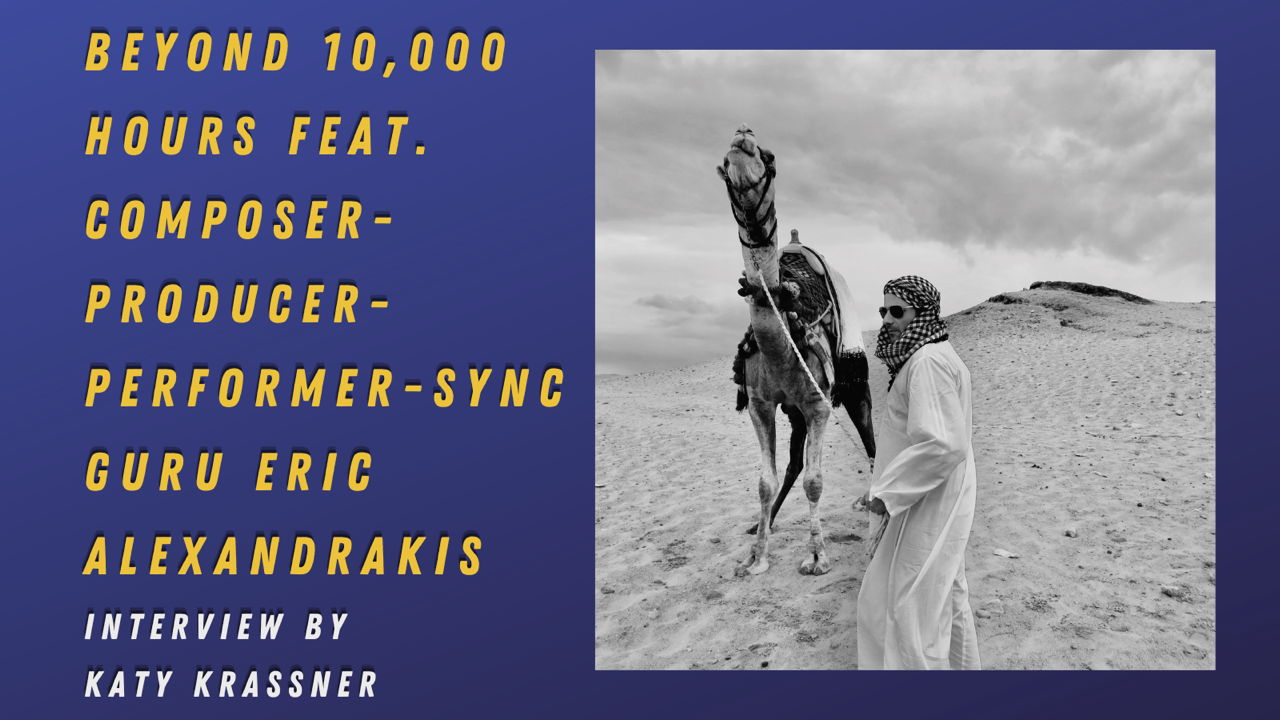Katy Krassner interviews singer/composer/producer/sync guru Eric Alexandrakis who doesn’t brag once in his Q&A that he has been nominated for two Grammy Awards or that Greece has publicly celebrated all of his achievements. Currently based in North America, Eric gives excellent advice to musicians who are starting out in the music industry.
Everybody is waiting for me to arrive
I grew up mainly in Coral Gables, FL and we also had a home in Greece. Scientific studies have shown that people who are on creative overdrive generally end up in the arts because of how we’re wired, so I think if it wasn’t music, it would have been something else creative.
I remembered melodies upon hearing them once, picked up instruments easily, was trained on classical music, and remember growing up watching old films and loving the way music and images merged. I had Greek music all around me, then European disco, then when New Wave hit, I felt like a part of my soul had found a home. ’77 – ’86 was just a goldmine of endless candy for me.
I didn’t study music at university; music was as natural as breathing, so it never occurred to me to go to college for that, as I was also in recording studios every week since I was 16, and classically trained. Plus, I never like the idea of being told what to do creatively. That never made sense to me, so going to school to learn how to be creative would have felt unnatural. If you want to be original, you must discover that on your own, no school can teach that. The tools are good, but the tools are useless if you’re not obsessed and committed at the same time with a goal and a plan.
Mechanical music, Adrenaline surge
Via my company, Minoan, I license my music to media, score films, come up with special projects and collaborations, and music supervise major brands. My master’s in music business was really the key as I deal with all the major labels and publishers, networks, and high-profile artists. Minoan supports my artistic side in that it keeps me focused on the idea that everything I do has to somehow monetize to keep the lights on. It also gives me credibility when seeking out name artists to collab with. Aspiring musicians often lack focus with too many ideas, which is a big reason why many of them fail. Without focus, we just wander with loads of unfinished concepts.
With sync, I started off with a lot of reality shows, video games, animation, then moved into ads, and films. 99% of what’s on my ASCAP statements I’ve never watched, and a lot of it I have no idea what it is because it’s in code. I’ve also done synchs for major artists like Duran Duran, Maggie Rogers, and every major electronic act from the last 20 + years when I was music supervisor for Live Nation and AEG at the same time.
Success in synch requires an entirely consistent method, set-up, approach, lingo, presentation and research. The key thing to understand is just because you think your rock track could be great for a movie or a Volvo commercial, doesn’t mean anyone else that matters will think that. For all you know, they’re looking for Malaysian hip-hop with a didgeridoo and a bear yodeling backwards. Too many artists think they can approach a music supervisor by telling them what they need, and that that’s enough to get licensed. We all hate that. It’s never about the artist; in this instance, it’s always about what the music supervisor needs at any given time.
Somehow the vital connection is made
Along with creating my own music and doing sync work, I also produce. If I want to collab with a name artist, I study their career, study where they currently are career wise, what they gravitate to, then design a presentation with angles that I think will appeal to them. I’m pretty hardcore when I digest someone’s catalogue, like when we worked with David Lynch on a film project I concocted. I spent an entire week watching all his films, short and long, which I’m sure changed the shape of my brain ever so slightly. The person you are reaching out to has to feel like you know their work, otherwise it all looks like a fake attempt to ride coattails.
Chasing dragons with plastic swords
For me the biggest changes in the business of music are the value of intellectual property, technology, radio consolidation, social media, distribution, the live music industry, the overtly manufactured branding of artists, and just the overall evolution of perception twisting slimeballery on steroids. With the devaluing of intellectual property via streaming, the only reason this current system exists is because it’s safe, yet totally unsustainable. The technology to preserve intellectual property value has existed since 1995 when I produced the first digitally watermarked CD while in grad school with the watermark’s inventor Scott Moskowitz. The tech is used today in everything and is the foundation for all security based digital exchange. If the industry knew how to use what we’re all already using, and has existed for 30 years, they’d make 10 times what they’re making now. There is an overabundance of greed masquerading as brains.
I like to diversify what I am doing at any given moment. Right now, I’m scoring a feature length documentary and am part of a children’s album from the late Melanie Safka coming out on Cleopatra Records. I’ve also been involved in the first DNA analysis of WWII victims in Greece, which is now moving into a new study phase.
